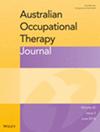The experiences of families of children with cerebral palsy and complex disability after three years accessing the National Disability Insurance Scheme
Abstract
Introduction
In Australia, children with cerebral palsy and complex disability receive funded supports through the National Disability Insurance Scheme (NDIS). This individualised funding scheme requires parents to navigate and advocate on behalf of their child, supported by expert reports, recommendations, and allied health services. Supports aim to enable participation in all areas of daily life, which may be otherwise largely inaccessible to children with complex disability and their families. This study aimed to explore the experiences of families of children with complex disability after 3 years accessing the NDIS.
Methods
A qualitative research design with a demographic questionnaire and in-depth interview was undertaken. Purposive sampling was used to recruit participants from one organisation providing occupational therapy and other allied health services. Data analysis implemented Braun and Clarke's thematic approach to examine the experiences of participants.
Consumer and Community Involvement
This research was conducted with a registered National Disability Insurance Scheme provider to give voice to parent consumers who raise children with complex disability.
Findings
Seven mothers and one father (N = 8) of children with complex disability were interviewed. Most parents reported increased success and satisfaction navigating the scheme. Five overall themes were generated from the data: pivotal roles of families, parental empowerment, life-changing equipment, the fallibility of the scheme, and a critical scheme.
Conclusion
Parents reported reliance on the scheme for their child's basic daily care and a more enriched life for their child and family. Parents were grateful for the scheme but experienced inconsistencies, navigation difficulties, and variable choice and control. Most parents had fears about the sustainability of the scheme, translating into uncertainty about their child's future. Allied health professionals, including occupational therapists, are key advocates for children with complex disability and their families. Collaboration through sharing knowledge and skills to support children, their families, and carers is key to empowering parents to navigate the NDIS.
PLAIN LANGUAGE SUMMARY
The National Disability Insurance Scheme (NDIS) provides funding for people with permanent and significant disability. Children with cerebral palsy (and other complex disability) are lifetime users of the NDIS. For children with complex disability, their families are crucial to ensuring that their daily needs are being met, including providing medication. Previous research indicated that parents rely on the NDIS to support their children; however, there have been various challenges such as long wait times for equipment and difficulty understanding how to use the scheme. This study explored the experiences of families of children with complex disability, after more than 3 years of being an NDIS participant. Eight parents from one therapy service provider completed a short questionnaire about themselves, their child, and their family, followed by an interview with the first author. Four authors (occupational therapists) worked together to design and implement this study. The findings highlighted several key points: the important role of parents as caregivers; parents became more knowledgeable and confident to navigate the NDIS with time; equipment funded by the NDIS was life-changing; the NDIS has ongoing issues; and the crucial nature of the NDIS. Occupational therapists can be extremely important to families, including with supporting families to navigate the NDIS and advocating for them. Occupational therapists must stay current with their knowledge of the NDIS as they provide lifetime support, including prescribing equipment, technology, and home modifications.


 求助内容:
求助内容: 应助结果提醒方式:
应助结果提醒方式:


